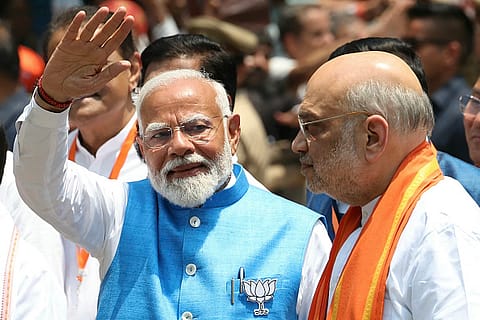Lok Sabha Results: Continuity of power may not translate into pro-growth policies now, says Bernstein
Brokerage major says weaker mandate for BJP may force govt to push for direct social schemes rather than focussing on pro-growth and investment-focussed approach

With the BJP getting a weaker mandate in the 2024 Lok Sabha Elections than expected, the investment approach to India would change materially in an “extreme scenario” if the opposition manages to wrest away the key allies, says a report. Global brokerage major Bernstein Societe Generale Group, in its latest India strategy report, says the current setback may be enough for the government to tweak some of its policies and increase spending towards direct social schemes rather than focussing on a pro-growth and investment-focussed approach. “With capex likely to be driven more by the private sector as end markets are changing, the role of Government will, in any case, moderate over time, limiting material risks to the cycle.”
In the very short-term perspective, the market sell-down is a bit extreme, leaving room for a modest rebound, with capex-linked stocks leading that, the report says. Given the numbers after the election results, the continuity of power may not fully translate into continuity of policies now, but a room for a large-scale tweak is unlikely.
Bernstein believes the government's policy of pushing manufacturing and construction is the right approach, but it will take several years to succeed. In addition, the perennial distress in agri and the inability to implement structural reforms (Farm bills) are still the key challenges. “We believe it is less likely to see a dramatic change in MSP policies or a shift towards creating direct employment by absorbing them in low-productive government jobs. There can be a short-term inflationary impact (<1%) but it is likely to be limited since we do not anticipate momentous MSP increases.”
While the ground shock is playing out, the return of populism is something that is feared at this moment, says Bernstein. “In a bid to directly boost consumption - we see risks to short-term inflation, capex and, to a lesser extent, fiscal discipline.”
In terms of rural focus, Bernstein does not see a quick fix to alter the growth landscape, but over a longer term, a risk of more focus on subsidies compared to the last five years is there.
Some focus on subsidies at the expense of capex is likely with the new formation at the Centre, a material impact in the near term is unlikely, says the report, adding that its previous stance on the market holds “good”. “Hence, we retain our view of high single-digit returns, with the Nifty target unchanged at 23,500. We see volatility to remain a feature given uncertainty on policy path.”
Notably, the opposition had promised many giveaway schemes this time - from filling up 3 million government vacancies quickly to INR100k annually to the poorest families. Bernstein says the better-than-expected mandate for the opposition will be seen as those policies gaining ground, and there is a risk that the new government may evaluate room to build more direct support schemes.
Recommended Stories
Notably, the BJP’s performance in the rural seats, which are more than 60% of the total constituencies, was poor. Poor growth in agriculture since FY15-16 and the slowest private consumption in 21 years has made a dent in the ruling party’s performance. “Clearly, the 5kg food distribution scheme hasn’t worked, and more will need to be done in this field to arrest a declining popularity,” the Bernstein report adds.